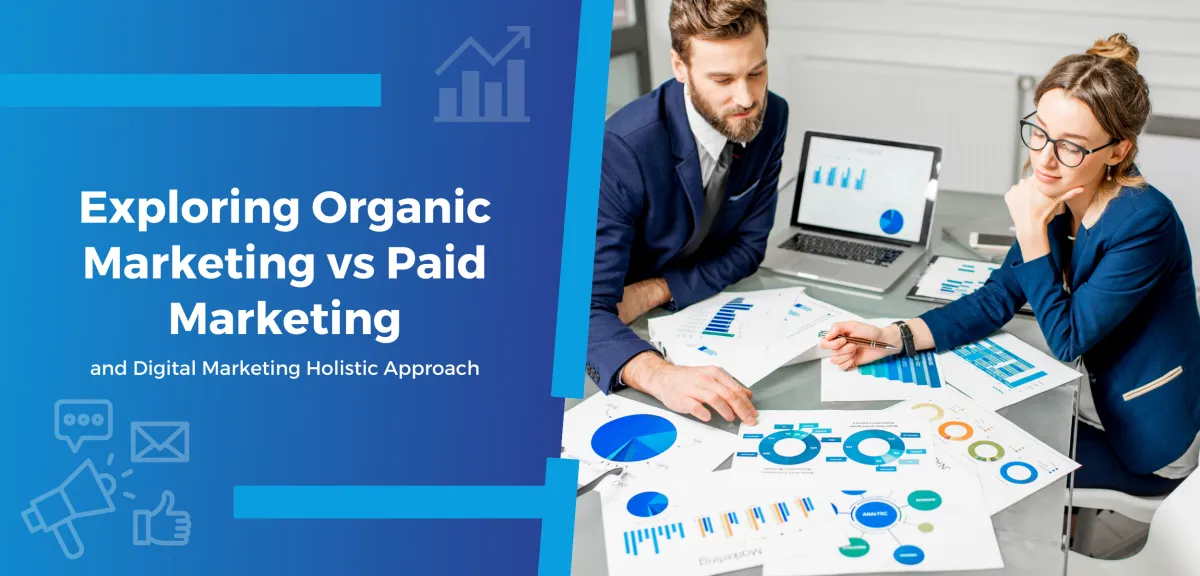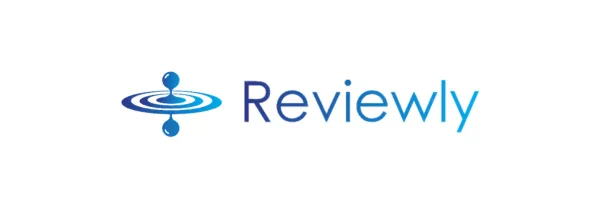BLOG

Exploring Organic Marketing vs Paid Marketing and Digital Marketing Holistic Approach
Exploring Organic Marketing vs Paid Marketing and Digital Marketing Holistic Approach
Welcome to the world of digital marketing, where opportunities abound and strategies evolve at lightning speed. In this fast-paced realm, two powerful techniques stand out – organic marketing and paid marketing. But the question lingers: should you choose one over the other or embrace a holistic approach that combines both?
To help you navigate these waters, at Reviewly, we will delve into the intricacies of each method and explore how they can help you attract more clients for your business. So buckle up as we embark on an exciting journey through the realms of organic and paid marketing!
What is digital marketing?
In today's digital age, marketing has taken on a whole new dimension. Gone are the days of traditional advertising methods like billboards and print ads. Enter digital marketing – a multifaceted approach that leverages various online platforms to connect with your target audience.
At its core, digital marketing encompasses all the strategies and techniques used to promote products or services through electronic devices and channels. From search engine optimisation (SEO) to social media marketing, email campaigns to content creation, the opportunities are virtually endless.
One of the key advantages of digital marketing is its ability to reach a global audience at any time, transcending geographical boundaries and time zones. With just a few clicks or taps, potential customers can discover your brand's offerings from anywhere in the world.
Moreover, digital marketing allows for precise targeting and personalised messaging. Through data analysis and consumer insights, you can tailor your campaigns to specific demographics or psychographics. This not only enhances engagement but also increases conversion rates as you deliver relevant content directly to those who are most likely interested in what you have to offer.
Another important aspect of digital marketing is its measurability. Unlike traditional forms of advertising where it's difficult to determine ROI accurately, with digital marketing tools such as data analytics software and tracking codes, you can monitor campaign performance in real-time. This data-driven approach enables you to assess which strategies are working effectively and make adjustments accordingly.
As technology continues to evolve rapidly, so does the field of digital marketing. Staying ahead requires adaptability and staying up-to-date with industry trends such as artificial intelligence (AI), voice search optimisation, chatbots, and virtual reality (VR). By embracing these advancements intelligently within your overall strategy, you can gain a competitive edge in an ever-changing landscape.
Digital Marketing truly offers boundless possibilities for businesses seeking growth on both local and international scales.
With countless avenues waiting to be explored, the choice between organic and paid marketing boils down to your unique goals, target audience, and available resources. So, let's dive deeper into each method.
Organic Digital Marketing
Organic marketing is an essential component of any successful digital marketing strategy. It refers to the use of natural, non-paid methods to increase online visibility and attract potential clients. Unlike paid advertising, organic marketing focuses on creating valuable content that resonates with your target audience.
One of the most effective ways to get more clients through organic marketing is by optimising your website for search engines. This involves conducting keyword research and incorporating relevant keywords into your website's content, meta tags, and URLs. By doing so, you can improve your search engine rankings and drive more organic traffic to your site.
Another important aspect of organic marketing is creating engaging and shareable content. This can include blog posts, videos, infographics, and social media updates that provide value to your audience. By consistently producing high-quality content that addresses their needs or solves their problems, you can establish yourself as an authority in your industry and build trust with potential clients.
Additionally, leveraging the use of social media platforms can significantly enhance your organic marketing efforts. Building a strong presence on platforms like Facebook, Instagram or LinkedIn allows you to engage directly with your target audience and share valuable insights or updates about your business.
Implementing a solid organic marketing strategy requires time and effort but it offers long-term benefits by driving targeted traffic to your website without relying solely on paid media and paid search.
"Tanya and the team at Reviewly have been fantastic. Such a simple onboarding process, great pricing and the knowledge she and her team have about SEO and how to build your brand and your business through local organic growth is second to none. We've already seen great improvements in our online presence as well as increased traffic to our site and increases in our reviews! Definitely recommend them if you're looking to make some powerful gains for you business online." -Damien Carey
Paid Digital Marketing
Paid marketing, also known as paid advertising or pay-per-click (PPC) advertising, is a digital marketing strategy where businesses pay to display their ads on various platforms. These platforms can include search engines like Google and Bing, social media platforms like Facebook and Instagram, and even websites that offer ad spaces.
One of the main advantages of paid marketing is its ability to reach a targeted audience quickly. With paid ads, businesses can choose specific demographics, interests, and locations to ensure their message reaches the right people at the right time. This level of targeting allows for better conversion rates and higher return on investment (ROI).
Another benefit of paid marketing is its scalability. Unlike organic marketing strategies that rely on slow growth over time, with paid advertising you have more control over how much traffic you want to generate. Whether it's a small-budget campaign or a large-scale promotion, you can adjust your ad spend accordingly.
Additionally, paid marketing provides valuable data insights that can inform future campaigns. By tracking metrics such as click-through rates (CTR), impressions, conversions, and cost per acquisition (CPA), businesses gain valuable insights into what works best for their target audience.
However, it's important to note that while paid marketing offers immediate results compared to organic methods which take longer to yield outcomes; it shouldn't be seen as a replacement for organic efforts entirely.
In fact, in many cases combining both organic and paid strategies creates a holistic approach towards digital marketing- providing optimal results in terms of visibility, relevance, and engagement.
As an example, a well-optimised website combined with targeted PPC ads will not only increase brand awareness but also improve search engine rankings, resulting in long-term benefits.
Ultimately, the decision between organic versus paid should depend on your business goals, budget, and target audience.
Organic efforts are essential for building trust, longevity, and establishing yourself as an authority within your industry.
On the other hand, paid advertising enables quicker visibility, reaching a wider audience, and generating immediate leads.
Digital Marketing Holistic Approach
Digital marketing is a multifaceted strategy that requires a holistic approach to be truly effective. A holistic approach means understanding and utilizing both organic and paid marketing techniques in harmony to achieve your overall goals.
Organic marketing focuses on building long-term relationships with target audiences through various channels such as content creation, social media engagement, and search engine optimisation (SEO). By consistently providing valuable content and engaging with your audience, you can establish trust and credibility over time.
On the other hand, paid marketing involves investing money in targeted advertising campaigns to reach a wider audience quickly. Platforms like Google Ads, Facebook Ads, or Instagram Ads allow you to create highly targeted ads based on demographics, interests, or keywords. This enables you to increase brand visibility and drive immediate traffic to your website.
Combining organic and paid strategies allows you to maximize your digital presence. Organic efforts help build a solid foundation while paid tactics provide an additional boost when needed. For example, using SEO techniques alongside PPC (pay-per-click) advertising can help improve your website's visibility in search results while driving instant traffic through ads.
By taking a holistic approach to digital marketing, you can leverage the strengths of both organic and paid methods for optimal results. It's important to continuously monitor analytics data from both approaches so that you can adapt your strategies accordingly.
Digital marketing is not just about choosing between organic or paid methods; it's about integrating them seamlessly into one cohesive strategy. With the right balance of organic efforts for long-term growth and paid tactics for immediate impact, you can effectively reach and engage your target audience while achieving your business objectives.
Conclusion
In today's digital landscape, it is clear that both organic marketing and paid marketing play vital roles in a successful digital marketing strategy. Each approach offers its own unique benefits and opportunities for businesses to reach their target audience.
Organic marketing, with its focus on creating valuable content, building relationships, and optimising for search engines, allows businesses to establish a strong online presence over time. By consistently providing high-quality content that resonates with their target audience, businesses can organically attract more clients and build trust within their industry.
On the other hand, paid marketing provides immediate visibility and instant results. With targeted advertising campaigns across various platforms like search engines and social media channels, businesses can directly reach potential clients who may not have discovered them through organic means alone. Paid marketing also offers advanced targeting options such as demographics, interests, and behaviour patterns to ensure your message reaches the right people at the right time.
While each approach has its advantages on its own, adopting a holistic digital marketing strategy that combines both organic and paid tactics can yield even greater results. By leveraging the strengths of both approaches simultaneously, businesses can maximize their online visibility while driving targeted traffic to their website or landing pages.
By utilizing effective SEO strategies in combination with paid ads tailored to specific goals or promotions, businesses can create a comprehensive digital marketing campaign that generates long-term growth while also achieving short-term objectives.
Ultimately, the choice between organic or paid depends on various factors such as budget constraints, time restrictions, and business goals.
It's important for every business owner/marketer to evaluate these factors carefully before deciding which route(s)to take.
Most importantly, it is crucial to continually track performance metrics, knowing what works best for your business so you adapt accordingly.
So, don't limit yourself by choosing one over the other; instead, optimise your efforts by incorporating both strategies into your overall digital marketing plan.
As technology evolves, and consumer behaviours change, your ability to adapt will be key in staying ahead of the competition in today's dynamic digital landscape.
In this section of the article, we've compiled a list of frequently asked questions along with their corresponding answers to provide you with a quick understanding of the topic of Organic VS Paid Marketing.
Q: What is the difference between organic and paid marketing?
A: Organic marketing refers to the use of free methods, such as content marketing and search engine optimisation, to attract and engage with audiences. Paid marketing, on the other hand, involves using paid advertising and promotion to reach target audiences.
Q: Should I focus on organic marketing, paid marketing, or both?
A: It depends on your marketing goals and marketing budget or resources. Organic marketing is a long-term strategy that requires consistent effort to build a strong online presence, while paid marketing can provide more immediate results but requires a budget. A combination of both can be highly effective in reaching a wider audience and achieving various marketing objectives.
Q: What are the benefits of organic marketing?
A: Organic marketing helps build credibility, trust, and long-term relationships with customers. It can also generate sustainable traffic and leads without continuous investment, as well as improve organic visibility in the search engine results or search engine rankings and brand authority over time.
Q: What are the benefits of paid marketing?
A: Paid marketing allows businesses to target specific demographics, increase brand visibility, and drive immediate traffic to their website or landing pages. It also provides detailed analytics and insights for campaign optimisation and can yield quick results compared to organic marketing.
Q: Can you give examples of organic marketing strategies?
A: Organic marketing strategies include content creation, search engine optimisation (SEO), social media engagement, blogging, influencer partnerships, and email marketing. These methods focus on delivering valuable, relevant content to attract and retain audiences naturally.
Q: How do paid and organic social media strategies differ?
A: Paid social media strategies involve using social media ads, sponsored posts, influencer marketing, and promoted content to reach a targeted audience, while organic social media strategies emphasize building a community, sharing valuable content, and engaging with followers without paid promotion.
Q: How can I utilise both organic and paid marketing effectively?
A: Integrating both strategies can be highly effective. Businesses can use organic marketing to build a strong foundation and long-term sustainability while supplementing it with paid marketing to amplify reach, drive quick results, and complement organic efforts.
Q: When should businesses invest in organic marketing?
A: It’s essential for businesses to invest in organic marketing from the start to build a sustainable online presence and brand authority. Consistent investment in organic marketing can yield long-term benefits, including increased organic traffic, visibility, and customer trust.
Q: What are some common marketing channels for paid and organic content?
A: Common marketing channels for both paid and organic content include social media platforms, search engines, email newsletters, influencer collaborations, content platforms, and community engagement. Each channel serves as a means to distribute and promote content to the target audience.






